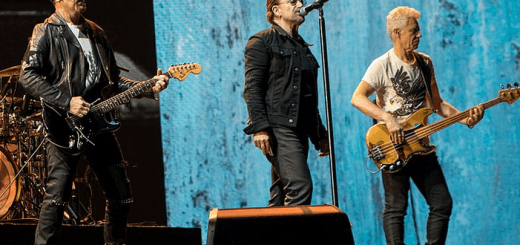Kite by U2 Lyrics Meaning – Unraveling the Poetic Layers of Life and Letting Go
Lyrics
I can feel it coming
I think I know what it means
I’m not afraid to die
I’m not afraid to live
And when I’m flat on my back
I hope to feel like I did
And hardness, it sets in
You need some protection
The thinner the skin
I want you to know
That you don’t need me anymore
I want you to know
You don’t need anyone or anything at all
Who’s to say where the wind will take you
Who’s to say what it is will break you
I don’t know which way the wind will blow
Who’s to know when the time’s come around
Don’t want to see you cry
I know that this is not goodbye
In summer I can taste the salt in the sea
There’s a kite blowing out of control on a breeze
I wonder what’s gonna happen to you
You wonder what has happened to me
I’m a man, I’m not a child
A man who sees
The shadow behind your eyes
Who’s to say where the wind will take you
Who’s to say what it is will break you
I don’t know where the wind will blow
Who’s to know when the time’s come around
Don’t want to see you cry
I know that this is not goodbye
Did I waste it?
Not so much I couldn’t taste it
Life should be fragrant
Roof top to the basement
The last of the rockstars
When hip-hop drove the big cars
In the time when new media
Was the big idea
That was the big idea
Within the poetic depth of U2’s ‘Kite’, lies a multifaceted narrative that transcends the simplicity of its title. Premiering in the band’s 2000 album ‘All That You Can’t Leave Behind’, ‘Kite’ soars as a poignant and reflective piece. At first listen, it may seem to merely reflect the whims of the wind, but a closer ear discerns a profound meditation on existence, loss, and transformation.
The song is a lyrical dance between fragility and strength, capturing the essence of human vulnerability and the innate drive for self-protection. As U2 takes the listener on this aural journey, we’re left with more than just a melody; we’re entrusted with a homage to the metaphysical essence of letting go, to the inherent tension between life and death, and to the inexorable passage of time.
Ephemeral Flight: Kite as a Metaphor for Life’s Impermanence
The title ‘Kite’ itself is not just a playful nod to a child’s toy, but a deeper symbol for life’s flight, flitting between control and surrender. Bono, U2’s frontman, harnesses the imagery of a kite ‘blowing out of control on a breeze’ to encapsulate the unpredictability of existence. As the lyrics ponder the inevitability of change and the currents of fate, the kite becomes us—adrift in the vast sky of life’s circumstances.
This metaphor extends to a broader canvas, where the kite embodies the soul’s journey through the turbulent winds of joy, sorrow, desire, and detachment. In the tension of the kite string, we find the delicate balance between holding on and letting go. The symbolic layers peel back to reveal life’s impending transitions, fostering a resonance that’s both personal and universal.
The Skin We Live In: Vulnerability and the Need for Armor
U2 doesn’t shy away from the vulnerability of being human. ‘Hardness, it sets in,’ Bono croons, recognizing how life’s abrasions leave us seeking armor—the ‘protection’ for our ‘thinner skin.’ The song urges an acknowledgment of our susceptibility to emotional exposure, and perhaps, in its wisdom, suggests that strength is born from this very vulnerability.
As ‘Kite’ delves into the layers beneath our surface, it transitions from the tender need for emotional safeguarding to the rugged poise of accepting life’s harsher truths without losing oneself. With each verse, the meaning deepens, contemplating the balance of resilience and openness required to navigate our human experience.
Interconnectedness and Independence: A Dichotomy of Need
The heart of ‘Kite’ pulsates with a nuanced dialogue between connection and autonomy. ‘I want you to know that you don’t need me anymore,’ speaks to an undercurrent of growth and the bittersweet release of dependency. This desire for the other to thrive independently hints at the cycles of relationship dynamics, be it parental, romantic, or platonic.
U2 taps into a poignant realization—that love, at its core, may sometimes mean stepping back, allowing the other to soar unaided. The paradox is palpable, where needing each other coexists with the celebration of solitary strength. Bono’s voice becomes a vessel for this complex interplay, exploring the liberating and lonesome facets of individuation.
Between the Lines: The Elusive Goodbye
A recurring motif in ‘Kite’ is the struggle to articulate a farewell that is not final—a ‘not goodbye.’ U2 crafts this sentiment with the finesse of those who have wrestled with separation. The phrase ‘I know that this is not goodbye’ echoes as an anthem of hope amidst the flux of change, threading the promise of continuity even in parting.
The theme resonates with anyone who has faced the paradox of departure—holding on to the essence of an experience or person, while physically letting go. This elusive goodbye shakes the listener, troubling the waters of complacency and demonstrating the ongoing dialogue between heart, memory, and the horizon of the unknown.
A Journey Through Time: The Last of the Rockstars
U2’s reflection in ‘Kite’ transcends personal sentiments and roots itself in the zeitgeist, capturing the essence of a generational shift. ‘The last of the rockstars, when hip-hop drove the big cars,’ marks not just a change in music preference, but a cultural metamorphosis. With ‘the time when new media was the big idea,’ the song becomes a timestamp, a vessel for the nostalgia and innovation of turn-of-the-century transition.
In these lines, ‘Kite’ is a testament to evolution—of music, of media, and of the self. The song encapsulates the journey from the ‘roof top to the basement’, perhaps a metaphor for the highs and lows of an era, as well as the personal peaks and valleys each listener navigates. The poignant inquiry, ‘Did I waste it? Not so much I couldn’t taste it,’ is a longing for meaning amid the ephemeral, reminding us to savor every note of life’s symphony, fleeting as it may be.








